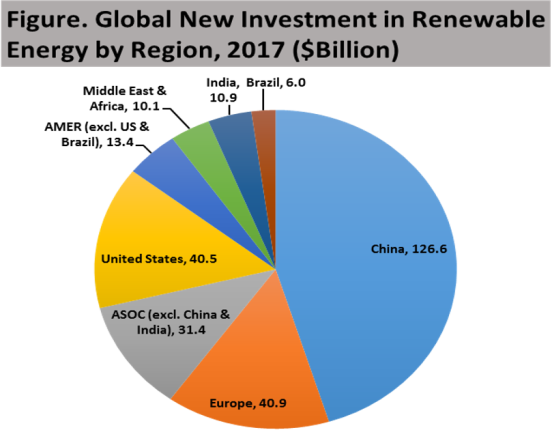-
Not Practicing What It Preaches: China Invests Heavily in Renewable Energy While Exporting Low-Efficiency Coal Power Plants to Developing Countries
November 14, 2018 By Evan Barnard
“China can simultaneously be the world’s biggest polluter and the leading developer and employer of clean energy technologies,” said Joanna Lewis, an associate professor of science, technology, and international affairs at Georgetown University’s Edmund A. Walsh School of Foreign Service at a recent event at The Brookings Institute on China’s local and global environmental agenda. “It’s not just megawatts being added, it’s actual investment in the innovation of these [renewable energy] technologies.”
In recent years, China invested significantly more in renewable energy than any other country or region (see figure below). This new surge in renewables puts a lot of pressure on coal plants. Despite this boom in renewables in China, last year construction began on hundreds of coal-fired power plants—equal in capacity to the entire U.S. coal fleet. Nevertheless, Barbara Finamore, the senior strategic director for Asia at the Natural Resources Defense Council, said, “China is going to make sure it meets its 2020 target for air quality, for coal capacity, for mandatory coal consumption cap, but it figures in the short term it can afford to be a little bit lax in order to meet its economic goals.”

Finamore said avoiding the very worst impacts of climate change will “require a fundamental transformation in the way that we obtain, store, and use energy.” She argued that “China should be working to accelerate the closure of coal plants rather than building new ones.” However, it’s unclear whether China’s new environmental ministry “really will have the power to stop the construction of coal plants,” said Lewis. Some experts, such as Carter Brandon, the World Bank’s lead economist for the Environmental and Natural Resources Global Practice, are pessimistic, noting that “the central government simply doesn’t have the enforcement capacity to implement all of the initiatives that it’s come up with on climate and the environment.”
China is willing to sell its energy technology to other nations, but those nations do not always choose the more sustainable options. “Countries essentially look at the old China model” and want to follow in the country’s footsteps, said Lewis. While China is now building some of the most efficient coal plants in the world, said Lewis, its expertise is in developing low-efficiency coal power plants. It is willing to sell developing countries the plans for building a coal power infrastructure it can no longer use itself. Finamore noted “coal power is not going to solve the energy and poverty problems around the world.”
According to the Intergovernmental Panel on Climate Change, renewable energy must comprise 70 percent to 85 percent of total global electricity needs by 2050. International cooperation will be critical to getting us where we need to go. “Enhancing collaboration between the United States and China is in the long run in each country’s own self-interest,” said Finamore. But scaling up to the level needed is “going to require cooperation between the two largest greenhouse gas emitters,” she said. “Working together is the way to really move ahead to the next level.”
Read More:
- China’s “One Belt One Road” plan and climate change will dry out the third pole.
- Energy efficiency is a major hurdle Chinese cities will face as they continue to grow economically.
- China could soon use renewable sources for most of its energy.
- Despite a power grid that increasingly distributes renewable energy, China needs to make its clean energy economic policy more sustainable.
Sources: Bloomberg New Energy Finance, EndCoal, Foreign Policy, Green Tech Media, UN Environment Programme, World Bank
Photo Credit: Paros Seas at the Richards Bay Coal Terminal (RBCT), located in Richards Bay harbour, South Africa, March, 2013, courtesy of Wikimedia Commons user Ossewa.
 A Publication of the Stimson Center.
A Publication of the Stimson Center.




